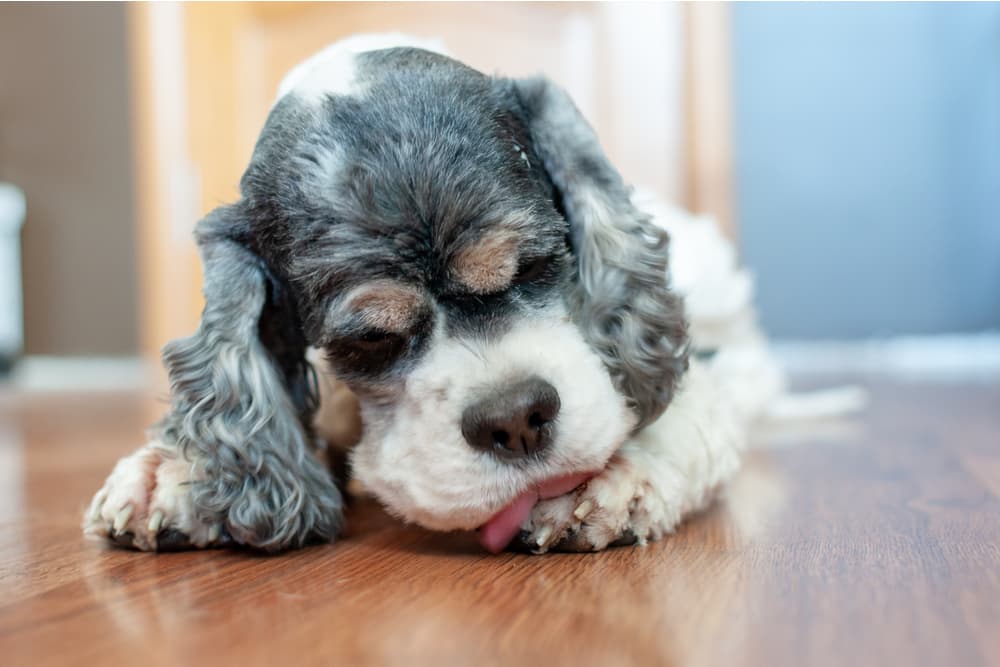Your dog has a few favorite pastimes: licking his food bowl, licking himself and licking the floor. He’s been known to lick the linoleum, taste the tile, and wipe down the wood with the fervent flick of his tongue.
There’s an obvious “ick” factor that comes from walking through the puddle of drool your dog left on the floor but it’s also just, well, weird. Or is it?
“Licking the floor can be totally normal,” says Dr. Sara L. Bennett, clinical assistant professor of veterinary behavior at North Carolina State University College of Veterinary Medicine.
Dog Licking: What’s Normal?

Dogs use their tongues for eating and grooming—lapping up kibble from the bottom of a bowl, taking a quick tongue bath, or offering up wet kisses are all normal behaviors, according to Bennett. However, habitual licking might be the sign of an issue.
“In the right context, licking is considered a normal behavior,” she adds.
To determine whether licking is a normal behavior, Bennett looks at where the licking occurs. In areas where there might be food scraps—think near their food bowls after supper or around the kitchen island—dogs might lick the floor to see if something tasty has fallen.

Frequency, intensity, and duration matter, too. Bennett notes that dogs that are licking the floor—or furniture, themselves, people, the air—nonstop without a specific reason could be a sign that something more serious is going on. In these cases, excessive licking of surfaces (or ELS), may be diagnosed.
“When it becomes more habitual—it’s happening multiple times a day in areas where there’s no food present…it lasts more than a couple of minutes and the behavior can’t be interrupted [by calling the dog or offering a treat], it starts to fall into the ‘abnormal’ category and we have to do some detective work to figure out why.”
Why Is My Dog Licking the Floor?

When it comes to deciphering the reasons your dog keeps licking the floor, there are a few common causes including:
- Food
- Upset stomach
- Stress
- Cushing’s Disease
Food

One of the biggest reasons your dog licks the floor? It may taste really good, says Bennett. A few drops of spilled coffee, a bit of bacon grease, a few scraps of spaghetti sauce can send your dog into a floor-licking frenzy to make sure every last drop is devoured.
“If you spill some food on the floor, of course your dog is going to be motivated to lick it up,” Bennett says.
When your dog is frantically licking the floor near the stove, your meal prep area, or the spot where she eats her kibble, Bennett says it’s likely nothing more than a desire to make sure every crumb is consumed.
As long as there aren’t scraps of foods that are toxic to dogs on the floor, it’s ok to let your dog serve as a four-legged vacuum.
Upset Stomach

Tummy troubles are among the most common reasons your dog’s licker may be working overtime. In fact, one study found that 73 percent of dogs that displayed ELS were diagnosed with gastrointestinal issues ranging from irritable bowel syndrome and pancreatitis to giardia.
“The hypothesis is that it’s a behavioral reaction to feeling sick to their stomachs,” Bennett explains.
It seems that the constant mouth and tongue movements your dog uses to lick the floor (and other surfaces) increases saliva production, which buffers against the acid in the stomach, according to Bennett. Or, perhaps the saliva provides added lubrication to make it easier to vomit, she adds.
When tummy upset is to blame, your dog may be licking the floor and vomiting, licking the floor and eating grass, or licking the floor and panting. Your vet can run tests to determine the source of the tummy upset. Treating the problem should help control the behavior (and feel better).
Stress

Like all repetitive behaviors, a dog constantly licking the floor could be a sign of an obsessive disorder or stress.
“Repetitive floor licking

